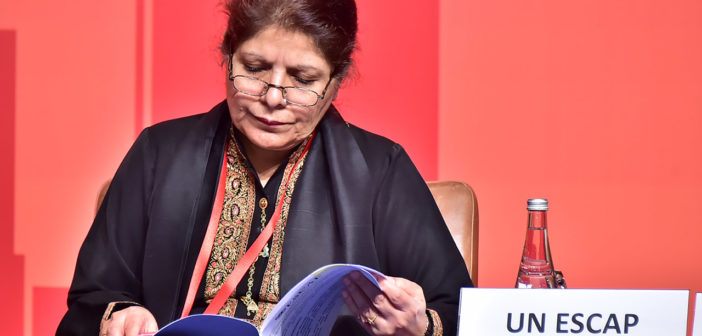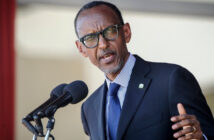| Dr Shamshad Akhtar, Executive Secretary of the UN Economic and Social Commission for Asia and the Pacific (ESCAP), said one of its key challenges is to make electricity supply available to an estimated 455 million people in the region who currently do not have access to power. While ESCAP works with governments, she sees an important role for private companies to help bring technology, capital and expertise together to help the region meet its numerous development goals.
An estimated 8,300 international delegates and energy professionals are expected to participate in Asia Power Week in Seoul in South Korea on September 20 to 22. Organized by Pennwell Corporation, the energy conference and exhibition is rated by industry officials as the most important in the Asia-Pacific region.
What is ESCAP’s message to Asia Power Week on its strategy and philosophy on working with private corporations to help Asia achieve its development goals?
ESCAP recognizes that there is a critical role for the private sector to provide the necessary investment, technology and expertise to support the implementation of the Sustainable Development Goals. The impact of the business sector across the Asia-Pacific region stems not only from the way they are run, but also in what they deliver for people and the planet. Our approach is to build an understanding of sustainable business practices, and guide the private sector through the different options available to them for the adoption and integration these practices. Business practices have considerable influence over each of the three pillars of sustainable development: economic, society and environment. ESCAP encourages and supports businesses of all sizes to embrace the principles of corporate sustainability or responsible business conduct (RBC), which go beyond traditional corporate social responsibility (CSR). While CSR refers to what business can do to help sustainable development, RBC is about ensuring businesses are sustainable. This is achieved by transforming business models or daily operations to be socially and environmentally responsible. In particular, ESCAP is promoting the UN Global Compact principles. These principles guide businesses on how to embrace and incorporate responsible behaviour into their everyday practices, helping to ensure that their role in achieving the Sustainable Development Goals (SDGs) is both meaningful and impactful. For successful partnerships between business, government and international organizations such as UNESCAP, it is important to ensure that the strengths of each partner complement one another. The partnership must have shared goals and not simply be limited to receiving financial contributions.
Specifically, how is ESCAP working with businesses, particularly those in the engineering sector, to bring clean energy into Asia’s fast-growing cities?
ESCAP’s works programme is focused at the intergovernmental level, primarily with ministers and senior officials. Our objective is to encourage and facilitate energy diversification and efficiency both among and within countries in the Asia-Pacific region. Via our regional cooperation platforms on sustainable energy and financing for development we are setting the stage for increasing investments in this area. In particular, we are working to ensure that countries recognize the benefits of renewable energy and shift towards these sources. Our experience demonstrates countries are recognizing the benefits of clean energy not only to supplement existing energy sources, but to also minimize the impact of pollution and climate. This benefits all people in the region, in particular vulnerabilities communities. Effective solutions and lowering of renewable energy cost, supported by initiatives launched by China, will help the process of energy transition to low carbon pathways. Concurrently, ESCAP has been promoting the integration of green growth strategies into country development policies to help ensure carbon free technologies are front and centre of development activities. Countries in the region have benefited from ESCAP’s e-learning platform on green growth and the policies on sustainable development from the Asia-Pacific Energy Portal, which are designed to enhance the capabilities among Government officials with concrete examples and good practices. ESCAP supports effective solutions to scale up the application of renewable energy, including support to widen energy access to vulnerable communities. For example, ESCAP provided substantive support for China, as the holder of the G20 Presidency this year, prepared the G20 Action Plan on Energy Access in Asia and the Pacific. Renewable energy was one of the most effective options to provide solutions for energy access in most of developing countries in the region. ESCAP has been promoting the pro-poor public private partnership (5P) for energy access in rural communities with locally available energy resources since 2005. The main objectives of such efforts are promoting private investment in energy access via a participatory process by the local communities and governments. Pilot projects with mini hydro-power and solar PV technologies have been established in Indonesia and Nepal. Our focus on capacity building is designed to ensure that the region has the knowledge required to implement sustainable development policies and be able to engineer effective public private sector partnerships that promote investment in infrastructure sector, especially for energy projects.
Asia currently faces a number of critical challenges: a slowing economy, increased geopolitical tensions and worsening pollution and climate conditions. Are we at risk of losing the race to bring sustainable development to Asia? Are the SDGs and specifically Goal 7 on affordable and clean energy too ambitious?
Goal 7 of the SDGs is composed of three targets – achieving universal energy access, increasing substantially the share of renewable energy and doubling the rate of improvement of energy efficiency. These are ambitious objectives for the Asia-Pacific region but the targets are achievable with the right levels of political commitment, increasing investment and innovative policy settings. In 2015, the Asia-Pacific region led the world in renewable energy investment, representing 50% of all new investment worldwide. With technological advances and market scale-up, new renewable energy sources such as wind and solar are projected to become some of the cheapest sources of electricity by 2030. The integration of renewable technologies into conventional power systems will only improve the sustainability of electricity supply and ultimately decrease costs. The use of advanced energy efficiency can also reduce costs and increase competiveness. Technological progress in better end-use energy efficiency and enhanced power transmission technologies need to be matched by policy frameworks that facilitate rapid adoption of these technologies. However, currently the region has an estimated 455 million people without access to electricity which requires urgent attention if the overall goal of SDG7 is to be met. Innovative decentralized technologies and business models to deploy these, as well as linking local energy provision to income generating activities are some of the solutions that will need to be pursued to achieve greater energy access. ESCAP has worked with China under its G20 Presidency to develop the G20 Energy Access Plan for Asia and the Pacific, which provides a framework with recommended steps for policymakers to address this area.
Courtesy: EnergyAsia |




